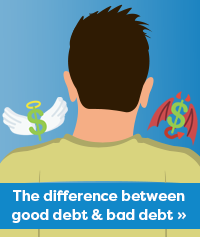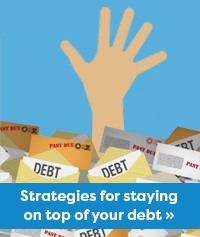What to Know About Payday Loans

If you suddenly find yourself unable to make a payment or cover an essential bill, you may feel inclined to turn towards a payday loan. These high-interest loans offer borrowers a sum of money (a portion of their next pay cheque) with the understanding that they, as the name suggests, will repay the loan on their next payday. While payday loans are legal, they are much more expensive compared to alternatives such as personal loans or lines of credit. If you’re considering using a payday loan service, take some time to understand the facts first.
Payday lenders operate by lending you a portion of the income you’ll be paid on your next pay cheque. They’ll often require you show proof of income first, and may even request that you fill out a pre-authorized debit form so they can make automatic withdrawals from your bank account.
Payday loans offer a number of perceived benefits to borrowers: they provide access to immediate cash, which you might find helpful in an emergency, and you don’t need to worry about a payday lender checking your credit history, which sounds like good news if your credit score is low. However, just because payday lenders don’t check your credit history, it doesn’t mean your credit can’t be impacted.
Although the Canadian Criminal Code defines the criminal rate of interest as anything exceeding 60% Annual Percentage Rate (APR), the exception is for payday loans under $1,500. Because of this, payday lenders can charge very high interest rates and give short repayment timeframes. In fact, in some provinces, payday lenders can have interest rates as high as 650% annually. This can lead to a cycle of borrowers taking out more loans so that they can pay back the previous ones. When borrowers are unable to pay back their loans, collection agencies may get involved. This can negatively impact the borrower’s credit score, as the payday loan company can put the collection item onto the borrower’s credit report, affecting future financial opportunities.
Some lenders will represent the cost of borrowing as a dollar amount rather than an interest rate, which may give you the impression that it is a more reasonable fee. For example, if you see a sign that reads “borrow $100 for only $15 for 14 days”, you might think that $15 is a relatively low cost. But remember that unlike credit cards and other loans that have interest rates calculated on an annual basis, payday loan fees are usually bi-weekly, so that $15 amounts to an annual interest rate of nearly 400%.
Before looking at a payday loan, you may consider if alternative options are available to you. This could include asking for more time to pay your bills, requesting a pay advance from your employer, or even cashing in your vacation days for additional income. As an alternative to payday lenders, your financial institution may be able to offer you a personal loan or line of credit, overdraft protection on your chequing account, or a payment deferral for your mortgage or term loan.
You should also review Nova Scotia’s Consumer Protection Act and Payday Lenders Regulations to understand your rights as a borrower. The maximum cost of borrowing a $100 payday loan is $17 in Nova Scotia, and the maximum penalty for a returned cheque or pre-authorized debit is $40.
If you find yourself with a payday loan, create a plan for making your repayment in full and on time so you don’t find yourself trapped in a cycle of borrowing. Speaking to a debt professional or a financial advisor can ensure you can avoid a similar position in the future. They may be able to help you identify and eliminate unnecessary expenses or build an emergency fund to keep your finances on track and get you out of the red.
If you’re wondering what makes a personal loan from a financial institution a good alternative to a payday loan, know that personal loans offer more transparency, and are bound by strongly regulated lending practices. You can also expect lower interest rates, longer repayment terms, and can take comfort in knowing the loan is based on your ability to repay. Because payday lenders do not require credit checks, those loans can put you at risk of borrowing money you’re unable to pay back. Financial advisors will work with you to determine the best way forward while prioritizing your financial health first and foremost.
While payday loans may seem like the right way to get quick access to cash, remember the risks associated with them and make an informed decision. If you find yourself struggling with debt or unable to make payments due to a financial emergency, please reach out to a member of our team at 902.492.6500 or email us at info@cua.com. Having some level of debt is common, the key is to ensure it is manageable and to know your options.
Published August 8, 2023






